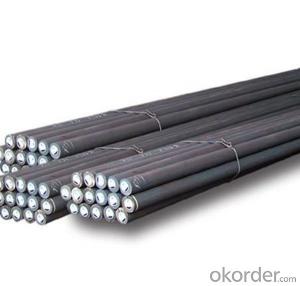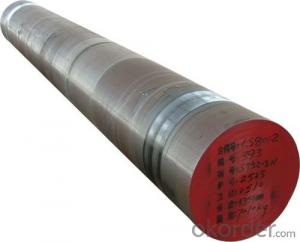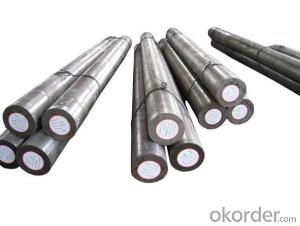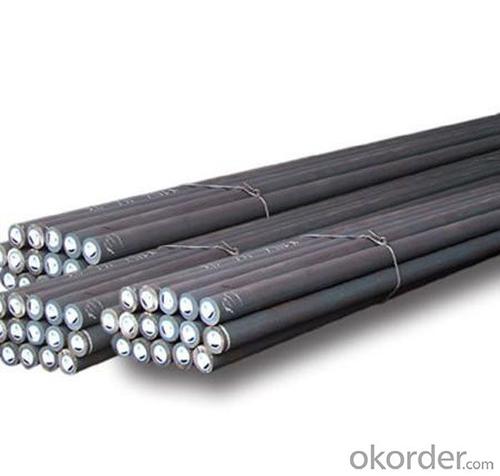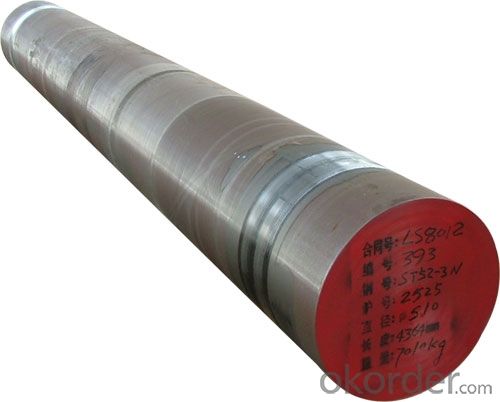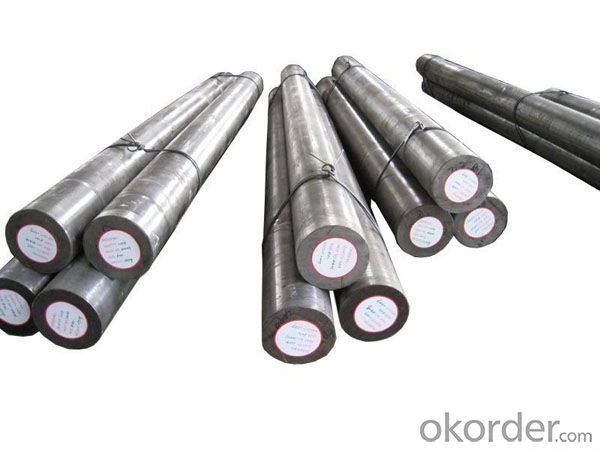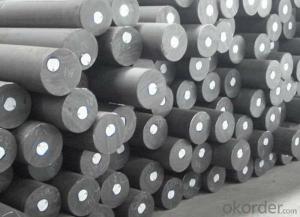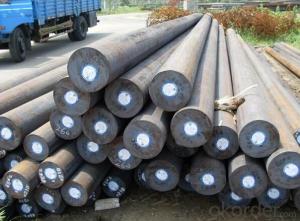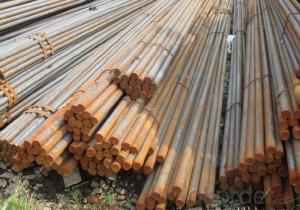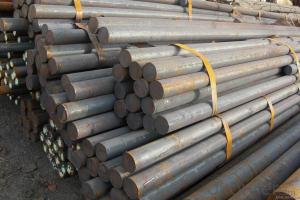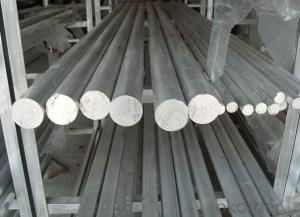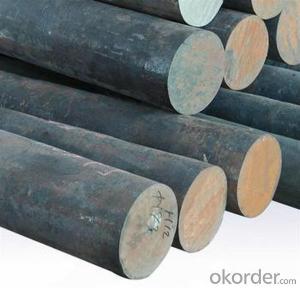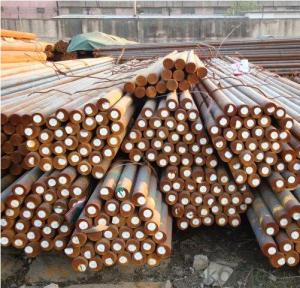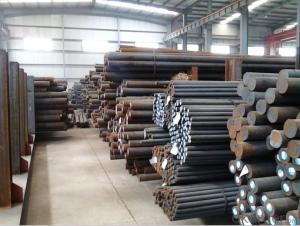4Cr5MoSiV1 Mould Steel Special Steel Alloy Steel
- Loading Port:
- China main port
- Payment Terms:
- TT OR LC
- Min Order Qty:
- 25 m.t.
- Supply Capability:
- 10000 m.t./month
OKorder Service Pledge
OKorder Financial Service
You Might Also Like
Specification
Chemical Composition%
| Country | Standard | C | Si | Mn | Cr | Mo | V | S | P |
| China(GB) | 4Cr5NoSiV1 | 0.32-0.45 | 0.80-1.20 | 0.20-0.50 | 4.75-5.50 | 1.10-1.75 | 0.80-1.20 | ≤0.030 | ≤0.030 |
| USA(ASTM) | H13 | 0.32-0.45 | 0.80-1.20 | 0.20-0.50 | 4.75-5.50 | 1.10-1.75 | 0.80-1.20 | ≤0.030 | ≤0.030 |
| Germany(DIN) | 1.2344 | 0.37-0.42 | 0.90-1.20 | 0.30-0.50 | 4.80-5.50 | 1.20-1.50 | 0.90-1.10 | ≤0.030 | ≤0.030 |
| Japan(JIS) | SKD61 | 0.37-0.42 | 0.90-1.20 | ≤0.50 | 4.50-5.50 | 1.00-1.50 | 0.80-1.20 | ≤0.030 | ≤0.030 |
Available Size
| Rolled flat steel | 20-90mm×205-610mm×L |
Heat Treatment
| Item | Temperature℃ | Hardness |
| Anneal | 750-800 | ≤229HB |
| Quenching | 1020-1050 | 56-58HRC |
| Quenching | 530-600 | 45-50HRC |
Characterstics
| 1.Higher thermal strength and hardness | ||||||
| 2.Better toughness and elevated temperature fatigue resistance | ||||||
| 3.Hardness maintaining ability at 600℃ | ||||||
| 4.Good polishing performance |
Applications: Suitable for aluminum and copper die-casting moulds working for long time at elevated temperatures,hot extrusion dies,core rod forging dies,plastic moulds,etc,also suitable for heat resistance thimbles,push rods and ejector sleeves


1, Your advantages?
professional products inquiry, products knowledge train (for agents), smooth goods delivery, excellent customer solution proposale
2, Test & Certificate?
SGS test is available, customer inspection before shipping is welcome, third party inspection is no problem
3, Payment Terms?
30% TT as deposit and 70% before delivery.
Irrevocable L/C at sight.
4, Trading Terms?
EXW, FOB, CIF, FFR, CNF
6, After-sale Service?
We provides the services and support you need for every step of our cooperation. We're the business partner you can trust.
For any problem, please kindly contact us at any your convenient time.
We'll reply you in our first priority within 24 hours.
- Q: How does special steel perform in terms of creep resistance?
- Special steel performs exceptionally well in terms of creep resistance. It is specifically designed to withstand high temperatures and long-term exposure to stress, making it highly resistant to deformation or failure under such conditions. Its unique composition and heat treatment processes enhance its ability to maintain structural integrity, making it a preferred choice for applications where creep resistance is crucial, such as in power plants, aerospace components, and high-temperature industrial environments.
- Q: What are the main advantages of using special steel in the automotive industry?
- Special steel offers several advantages in the automotive industry. Firstly, it provides enhanced strength and durability, ensuring the safety and reliability of vehicles. Secondly, special steel is lightweight, contributing to fuel efficiency and reducing carbon emissions. Additionally, it offers excellent formability and weldability, allowing for complex and intricate designs. Lastly, special steel possesses high corrosion resistance, extending the lifespan of automotive components and reducing maintenance costs. Overall, the use of special steel in the automotive industry enhances performance, efficiency, safety, and longevity.
- Q: Can special steel be used for nuclear power plant components?
- Yes, special steel can be used for nuclear power plant components. Special steel alloys such as stainless steel, low-alloy steels, and nickel-based alloys are commonly used in nuclear power plants due to their excellent mechanical properties, resistance to corrosion, and ability to withstand high temperatures and radiation. These materials are specifically designed to meet the stringent safety and performance requirements of nuclear power plant components, ensuring the integrity and reliability of the plant.
- Q: How is special steel used in the production of automotive springs?
- Automotive springs, including suspension springs and valve springs, require special steel due to its unique properties that make it perfect for this purpose. Special steel, also called alloy steel, is specifically designed to have superior mechanical properties compared to regular steel. By adding alloying elements like chromium, nickel, or molybdenum, its strength, hardness, and resistance to wear and fatigue are improved. When it comes to producing automotive springs, special steel is used to create springs capable of withstanding the demanding conditions of the vehicle's suspension system. These springs must not only absorb and distribute the vehicle's weight but also provide a smooth and comfortable ride. The exceptional strength of special steel allows automotive springs to handle heavy loads without deforming or breaking. This is crucial for maintaining vehicle stability and safety, especially on rough roads or when carrying heavy loads. Furthermore, special steel's fatigue resistance is vital in the production of automotive springs. Over the vehicle's lifespan, these springs undergo millions of compression and expansion cycles. The fatigue resistance of special steel ensures that the springs can maintain their performance and reliability over an extended period. Moreover, special steel's resistance to wear and corrosion is highly advantageous in automotive applications. Springs are exposed to various environmental elements like moisture, dirt, and chemicals, which can cause corrosion and deterioration. The corrosion resistance of special steel helps prolong the lifespan of automotive springs and maintains their functionality. In conclusion, the use of special steel in manufacturing automotive springs guarantees that these crucial components can endure heavy loads, repetitive stress, and high temperatures. Its superior mechanical properties, including strength, fatigue resistance, and corrosion resistance, make it the ideal material for automotive springs, enhancing the overall performance and durability of vehicles.
- Q: What are the different types of heat-resistant steel?
- There are several different types of heat-resistant steel, including austenitic stainless steel, martensitic stainless steel, ferritic stainless steel, and nickel-based alloys.
- Q: How does special steel contribute to the packaging aftermarket industry?
- The packaging aftermarket industry greatly benefits from the use of special steel, which provides various advantages that enhance the efficiency and quality of packaging processes. Firstly, special steel is renowned for its exceptional strength and durability, making it ideal for the manufacturing of packaging machinery and equipment. This durability ensures that the machinery can withstand the demanding requirements of the industry, resulting in improved reliability and less downtime. Additionally, special steel boasts excellent resistance to corrosion, making it highly suitable for packaging applications that involve exposure to moisture, chemicals, or extreme temperatures. This corrosion resistance extends the lifespan of packaging equipment and prevents degradation, ultimately reducing maintenance costs and enhancing the overall efficiency of the packaging aftermarket industry. Moreover, special steel can be customized to meet specific needs, allowing for the production of tailored packaging solutions. This flexibility and versatility enable manufacturers to create innovative designs that enhance product protection, optimize space utilization, and improve transportation logistics. For example, special steel can be used to manufacture lightweight yet strong packaging materials, reducing shipping costs and minimizing the environmental impact associated with packaging waste. Furthermore, special steel possesses excellent machinability and weldability, making it easy to fabricate intricate packaging components with high precision. This capability enables manufacturers to produce packaging solutions that perfectly fit specific product dimensions, ensuring optimal protection during transit. In conclusion, special steel plays a vital role in the packaging aftermarket industry by offering strength, durability, corrosion resistance, customization options, and excellent machinability. These qualities contribute to the overall efficiency, reliability, and quality of packaging processes, benefiting both manufacturers and consumers.
- Q: What are the different methods of improving the impact toughness of special steel?
- There are multiple ways to increase the impact toughness of special steel. Here are a few commonly utilized techniques: 1. Heat Treatment: Heat treatment is a highly effective method that involves subjecting the steel to specific heating and cooling processes. For example, quenching and tempering can significantly enhance the impact toughness of steel. Quenching rapidly cools the heated steel in a liquid medium like oil or water, while tempering involves reheating the quenched steel to a specific temperature and then slowly cooling it. This process refines the steel's microstructure, making it more resistant to fractures and improving its impact toughness. 2. Alloying: Another method is alloying, which entails adding specific elements to the steel composition. Elements like nickel, chromium, and molybdenum can enhance the toughness of steel by modifying its microstructure and improving its resistance to impact. These alloying elements reduce the formation of brittle phases and enhance the steel's ductility. 3. Grain Refinement: The grain size of steel is crucial in determining its impact toughness. By refining the grain size, the steel can exhibit improved toughness. This can be achieved through techniques like controlled rolling or severe plastic deformation. These methods break down large grains and promote the formation of smaller, more uniform grains, resulting in enhanced toughness. 4. Shot Peening: Shot peening is a surface treatment technique that involves bombarding the steel surface with small metallic or ceramic shots. This process induces compressive stress on the surface, reducing the likelihood of crack propagation and improving impact toughness. 5. Welding Techniques: When welding special steel, specific techniques can be employed to enhance its impact toughness. Preheating the steel before welding and controlling welding parameters like heat input and cooling rate help reduce the formation of brittle phases and improve the toughness of the welded joint. It's important to consider various factors like the desired level of toughness, the steel composition, and the intended application when selecting the appropriate method for improving the impact toughness of special steel. A comprehensive understanding of the steel's properties and specific requirements is crucial in determining the most suitable method for enhancing its impact toughness.
- Q: What are the main advantages of using special steel in the construction of bridges?
- The main advantages of using special steel in the construction of bridges are its high strength-to-weight ratio, excellent corrosion resistance, and durability. Special steel possesses superior mechanical properties, allowing for the construction of lighter and more efficient bridge structures. It also offers enhanced resistance to environmental factors like moisture, temperature variations, and chemical exposure, leading to longer service life and reduced maintenance costs. Additionally, special steel facilitates the use of innovative and complex bridge designs, enabling architects and engineers to create unique and aesthetically pleasing structures.
- Q: How is special steel used in the production of aircraft components?
- Special steel is used in the production of aircraft components due to its exceptional strength, durability, and corrosion resistance. It is utilized in critical areas such as landing gear, engine parts, and structural components to ensure the safety and performance of the aircraft.
- Q: How does alloy steel improve the strength and toughness of steel?
- Alloy steel improves the strength and toughness of steel by introducing additional elements, such as chromium, nickel, or manganese, which alter the microstructure and properties of the material. These alloying elements form solid solutions, precipitates, or carbides, which strengthen the steel by hindering dislocation movement and grain growth. The resulting steel exhibits higher tensile strength, better resistance to wear, improved hardness, and increased toughness, making it suitable for various demanding applications.
Send your message to us
4Cr5MoSiV1 Mould Steel Special Steel Alloy Steel
- Loading Port:
- China main port
- Payment Terms:
- TT OR LC
- Min Order Qty:
- 25 m.t.
- Supply Capability:
- 10000 m.t./month
OKorder Service Pledge
OKorder Financial Service
Similar products
Hot products
Hot Searches
Related keywords
